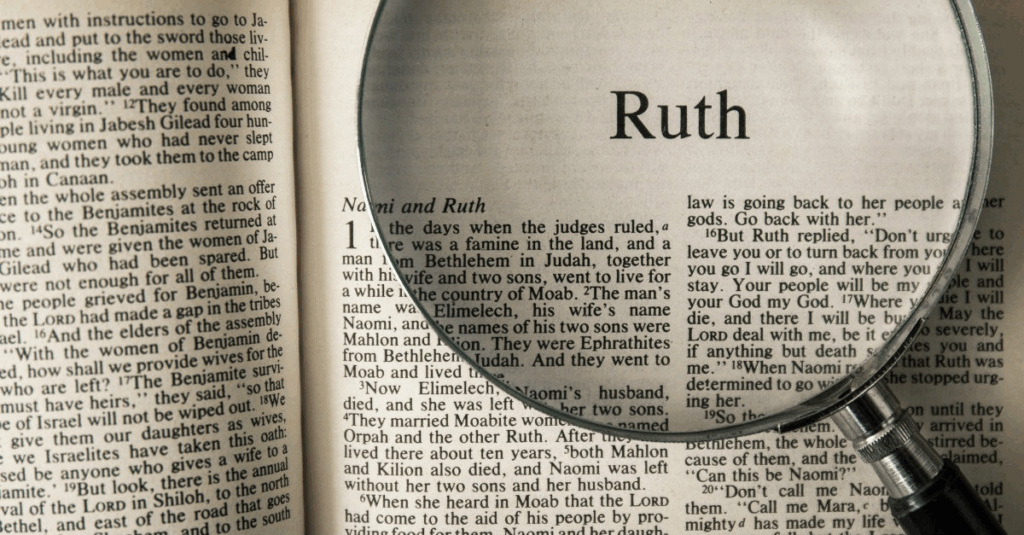
The Book of Ruth is deceptively quiet. It’s only four chapters long—no parting seas, no plagues, no prophets. But don’t be fooled by its calm. Ruth may be the most radical book in the Bible, not because of what it shouts, but because of what it dares to whisper.
Ruth’s story begins in grief: famine, displacement, and death. But it pivots on something far more powerful—choice. Ruth, a Moabite widow, is bound to her Israelite mother-in-law Naomi not by obligation, but by love. When Naomi urges Ruth to return to her own people, Ruth refuses with words that have echoed through generations:
“Do not urge me to leave you, to turn back and not follow you.
For wherever you go, I will go; wherever you lodge, I will lodge;
your people shall be my people, and your God my God.” (Ruth 1:16)
This is not just an emotional plea—it’s a spiritual revolution. Ruth isn’t just staying with Naomi. She’s stepping into a new identity. She’s choosing to belong. Not because she must. Not because it benefits her. But because it means something.
In the Jewish world today, we often treat identity as something you’re either born into or not. Did you go to Hebrew school? Have a bar mitzvah? Support Federation? Great—you check the boxes. But Ruth challenges this framework. She wasn’t born Jewish. She didn’t grow up with Shabbat or Jewish law. Yet she becomes the great-grandmother of King David. The foundations of Jewish monarchy—and, by tradition, the messianic future—run through her.
Why? Because Judaism is not only inherited. It is also chosen.
Ruth reminds us that intention, commitment, and courage matter just as much as lineage. This isn’t just theological nuance—it’s deeply personal. Today, our communities include Jews by choice, interfaith families, Jews returning after generations away, and spiritual seekers who don’t always “fit.” Ruth tells us they are not peripheral. They are central. They are not fringe figures—they are forebears.
But her choice was not easy. Ruth gives up everything familiar—language, land, comfort—for a life of uncertainty. Her belonging is not transactional. It is sacrificial. And that’s what makes it holy.
This message is especially urgent now. Since October 7, many Jews have felt unmoored, even unsafe. Public displays of Jewish identity—Stars of David, Hebrew letters, Israeli flags—have become flashpoints. Universities, public spaces, and social media have often become inhospitable to Jewish visibility. In a moment when many feel pressure to shrink or stay silent, Ruth’s voice calls to us: “Where you go, I will go… your people shall be my people.” Belonging, she teaches, isn’t about comfort. It’s about covenant. About showing up—even when it’s hard.
To be Jewish has never been about ease. It’s been about commitment. About standing with each other, carrying our history forward, and choosing to belong even when the world suggests otherwise.
And here’s the harder question: if Ruth walked into one of our synagogues today—alone, unfamiliar, maybe without the “right” background—would we welcome her? Would we see her? Too often our institutions are designed for the insider, not the seeker. But Ruth reminds us: the seeker is the story.
Ruth’s journey ends not in tragedy, but in birth. She marries Boaz, and their son Obed becomes the grandfather of King David. Her choice leads to a future. From loss comes legacy. From vulnerability, redemption.
We live in a time of fear, division, and dislocation. But Ruth’s story insists that it is still possible to choose meaning, to choose peoplehood, to choose hope. She teaches us that the future of the Jewish people depends not only on who we raise—but on who we embrace.
This Shavuot, as we read her story, may we remember: identity is not just where we come from. It is who we choose to be. And may we, like Ruth, choose to belong—bravely, fully, and together.
Leave a Reply